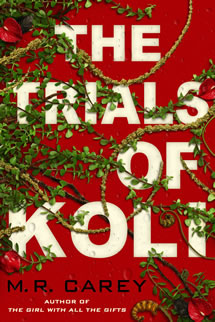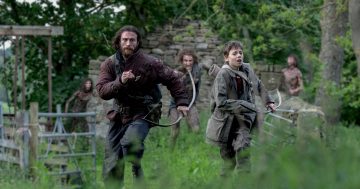Reviewed by Robert Goodman.
By MR Carey, Orbit, $22.99.
 The Trials of Koli is the second book in MR Carey’s Koli trilogy, following on from The Book of Koli. The series is based in a post-apocalyptic Britain where small communities eke out an existence using old pieces of technology to protect themselves against a dangerous world. This is a world in which not only features new and vicious creatures but the trees themselves will kill you if you are not careful. As the first book revealed, having small communities almost cut off from each other is shrinking the gene pool, making humanity’s long term survival in this world increasingly less tenable. Being the second book of a trilogy, this review will necessarily contain spoilers for book one.
The Trials of Koli is the second book in MR Carey’s Koli trilogy, following on from The Book of Koli. The series is based in a post-apocalyptic Britain where small communities eke out an existence using old pieces of technology to protect themselves against a dangerous world. This is a world in which not only features new and vicious creatures but the trees themselves will kill you if you are not careful. As the first book revealed, having small communities almost cut off from each other is shrinking the gene pool, making humanity’s long term survival in this world increasingly less tenable. Being the second book of a trilogy, this review will necessarily contain spoilers for book one.
The Trials of Koli opens not long after the end of The Book of Koli. Koli and his companion Ursala are heading south to find London, which is also the source of a mysterious signal identifying itself as the Sword of Albion. With them as a prisoner is Cup, acolyte of the crazy messianic cult that Koli and Ursala burnt to the ground, and the artificial intelligence Monono who speaks to Koli from a music player. As well as Koli’s story, this volume has a second narrative thread, that of Spinner, the woman who Koli lusted after but who married his best friend. Spinner’s tale, besides going over some old ground from a different perspective, brings the reader back to Koli’s village and the tribulations it experiences after his departure. The two narrative strands have a few common elements (in particular the aggressive forces of Half-Ax), but do not in any way come together in this volume.
The Book of Koli was standard post-apocalyptic origin story, with the main character learning that his world is bigger than he thought and ending with him leaving to see and possibly save that world. The Trials of Koli is, if anything, more of the same, on a slightly bigger canvas. Koli and his crew visit the ruins of Birmingham and then spend most of the book with a welcoming coastal community with whom they have to make a deal in order to continue their journey on water. Along the way the four – Koli, Ursala, Cup and even Monono the AI – become a de facto family. The world feels slightly larger by the end of the book but not by much (although a cliffhanger ending again hints at more). Meanwhile Spinner’s story comes across as Koli’s story retold in a not too different voice and considers what might have happened if he had found a modicum of acceptance in the community for his crimes. The beats are the same, the revelations are the same, although the outcome for Spinner is different.
There is plenty of post-apocalyptic fiction out there, particularly set in the greening ruins of Britain. Besides a few strange animals and some deadly plants, the Koli series does not do much to set itself apart from these. That coupled with the idiosyncratic, simplified narration style and a distinct lack of forward movement make this one of the least engaging of the bunch. As noted, there is a bit of cliffhanger and the promise of more interesting developments that should bring readers back for book three, it is just a shame that it felt like such a long slog to get there and that those critical revelations are still to be made.
This and 500 more reviews can be found at www.pilebythebed.com.











